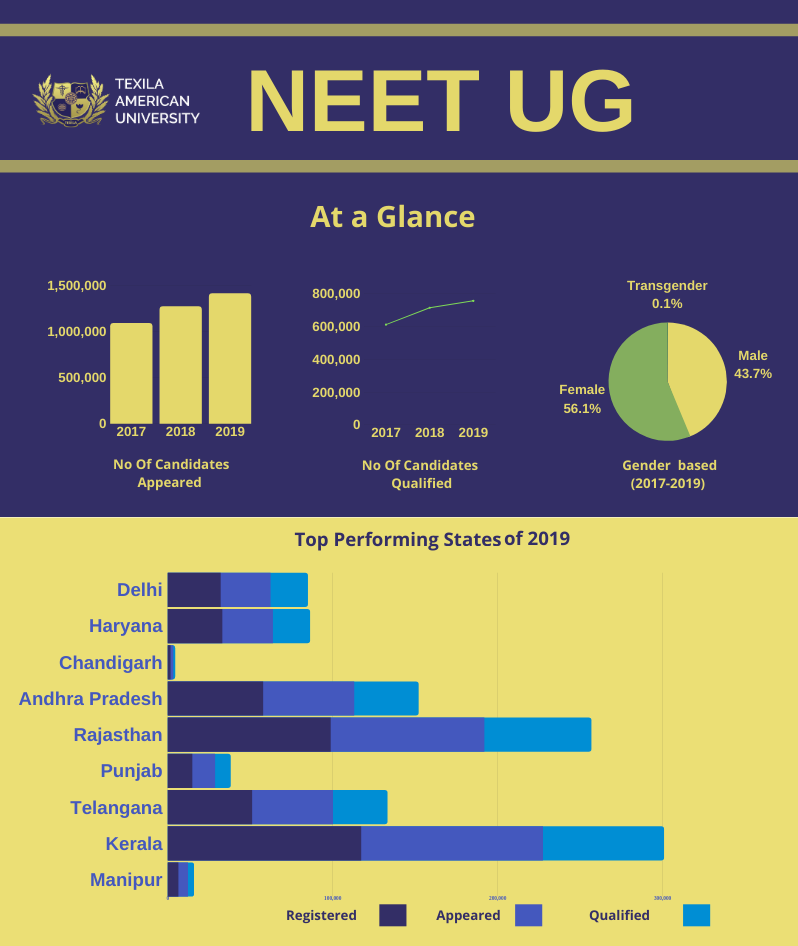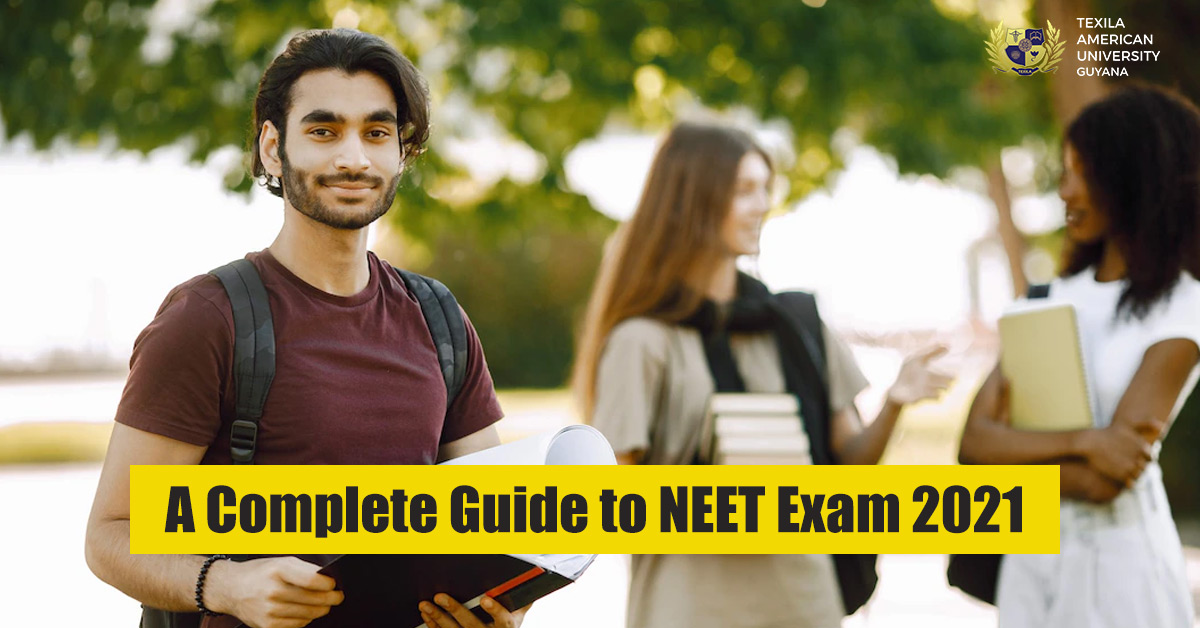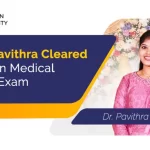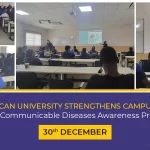Blog Summary
Many individuals wonder about the NEET exam and how to prepare for it. NEET UG, conducted by the CBSE, is a nationwide entrance test for admission to MBBS and BDS courses, excluding AIIMS & JIPMER Puducherry. This prestigious exam assesses your aptitude and skills in the medical field. With over 10 million students taking NEET, it has become a vital milestone for pursuing a medical career in India. In this article, we aim to answer all your NEET-related queries, addressing the exam’s nature, preparation strategies, and more. Let’s delve into the details and equip you for success in this significant examination.
- Introduction to NEET UG
- MBBS Seat Allocation Across India
- Top Medical Colleges Across India
- NEET UG Eligibility Criteria
- Documents Required to Apply for NEET UG
- NEET UG Exam Fee Structure
- Community-Based Seat Reservation
- NEET UG Exam Pattern
- NEET 2021 Preparation Tips
- Exam-Day Checklist
- Dress Code to Be Followed
- Banned Items in the NEET Exam Hall
- Punishment for Offenders
- NEET 2021 Result
- Study Medicine in Texila American University
- Study MBBS Abroad!
So, you’ve decided to attempt the NEET exam, more power to you. With a vast syllabus to cover, and with over 15,00,000 candidates across India trying to crack the exam every year, NEET UG is the most significant and challenging medical entrance examination a medical aspirant can attempt in India.
As the title suggests in this article, we will cover all the aspects from registering to preparation and other essential details you should know regarding the NEET UG exam.
Introduction to NEET UG
National Eligibility cum Entrance Test (NEET) is an all-India level medical entrance exam conducted by the National Testing Agency (NTA). Qualifying for NEET is the first step for aspirants to a medical career in India.
The exam is a three-part multiple-choice question based, which takes around 3 hours to complete. It is conducted in India across 154 NEET exam centers every year.
Here are some of the essential dates one needs to keep in mind:
| NEET UG Important Dates 2020 | |
| Date | Events |
| December 2, 2019 | The application window opens for NEET 2020. |
| December 31, 2019 | This is the last date to apply for NEET 2020. |
| January 01, 2020 | Last date for the payment of the NEET registration fee |
| January 15, 2020 | Corrections window opens to correct any mistakes made in the NEET application form. |
| January 31, 2020 | This is the last date to submit corrections in the NEET application form. |
| April 1–May 3, 2020 | Extended corrections window (1) |
| May 15–May 31, 2020 | Extended corrections window (2) |
| July 4–July 20, 2020 | Extended corrections window (3) |
| August 26, 2020 | Release of NEET 2020 candidate admission card |
| September 13, 2020 | NEET UG 2020 exam date |
| Last week of September 2020* | Release of NEET UG provisional answer key online |
| First week of October 2020* | Release of NEET UG final answer key online |
| Second week of October 2020* | NEET exam result |
*Subject to change.

MBBS Seat Allocation Across India
| Type of College/University | Number of Colleges/Universities | Number of MBBS Seats |
| Government Colleges | 272 | 41,388 |
| Private Colleges | 260 | 35,940 |
| Total | 532 | 77,428 |
Source: Medical Council of India
Top Medical Colleges Across India
| S. No. | Name of the Institution | No. of Seats |
| 1 | Seth Gordhandas Sunderdas Medical College – Mumbai | 250 |
| 2 | Armed Forces Medical College – Pune | 130 |
| 3 | King George Medical College – Lucknow | 250 |
| 4 | Maulana Azad Medical College – New Delhi | 250 |
| 5 | Grant Medical College – Mumbai | 200 |
| 6 | Byramjee Jeejeebhoy Medical College – Ahmedabad | 250 |
| 7 | Lady Hardinge Medical College – New Delhi | 200 |
| 8 | Kolkata Medical College – Kolkata | 250 |
| 9 | Patna Medical College – Patna | 150 |
| 10 | Institute of Medical Sciences Banaras Hindu University – Varanasi | 84 |
Source: SuccessCDs
NEET UG Eligibility Criteria
The NEET exam has specific criteria for its candidates to be met and to be eligible for the exam.
- Age Limit: The candidate must be 17 years of age to be eligible for registration. The upper limit for general quota is 25, while OBC-NCL (Non-Creamy Layer), SC, ST, and PwD are given a 5-year relaxation bringing the upper limit to 30 years.
- Academic Qualification: Candidate must have successfully completed their 12th standard exam with Biology, Chemistry, Physics, and English with at least 50% of marks while OBC-NCL/SC/ST requires 40%, and PwD candidates require 45% for admission.
Documents Required to Apply for NEET UG
The NTA requires NEET aspirants to apply through the online portal for NEET 2021 registration.
Let’s break this down for you.
● Step 1: Visit the NEET portal and go through the instructions.
● Step 2: After going through, check the box “I have read and understood all the instructions mentioned…” and click on the “Proceed to apply for online NEET (UG) 2020.”
● Step 3: Fill the required details and upload the required documents.
Note: The system will not accept the documents if it is under or above the recommended size.
| Sl. No. | Scanned Documents | Acceptable Size Range |
| 1 | Passport size photograph (color photograph with the white background). It must be taken on/after September 1, 2019. | 10–200 KB |
| 2 | Postcard size photograph, i.e., 4” x 6” (color photograph with the white background) | 50–300 KB |
| 3 | Candidate’s signature | 4–30 KB |
| 4 | Left-hand thumb (ideally) or right-hand thumb impression of the candidate | 10–50 KB |
| 5 | Class 10th passing certificate | 100–400 KB |
Source: Collegedunia
Note: If the candidate is a student from Jammu and Kashmir and Ladakh and opting for 15% All India Quota, the NTA system automatically generates a self-declaration once the NEET application is submitted. It is recommended to keep this copy of such self-declaration for the record.
NEET UG Exam Fee Structure
| Category | Fee |
| For General (UR) | Rs. 1500/– (INR) |
| For General-EWS/OBC (NCL) | Rs. 1400/– (INR) |
| For SC/ST/PwD/Transgender | Rs. 800/– (INR) |
Source: Collegedunia
Note: The fee above is not inclusive of GST.
Community-Based Seat Reservation
This is the all-India medical reservation list.
| Category | Reservation |
| General Economically Weaker Section (GEN – EWS) | 10% |
| Scheduled Caste (SC) | 15% |
| Scheduled Tribe (ST) | 7.5% |
| Other Backward Caste (OBC-NCL) | 27% |
| Persons with Disabilities (PwD) | 5% |
Source: Collegedunia
NEET UG Exam Pattern
Syllabus
The NEET-UG examination test paper includes multiple-choice questions from Botany, Zoology, Chemistry, and Physics. You can check and download the curriculum from the official MCI website here.
Subject-Wise Distribution of Questions and Marks
| Subjects | No. of Questions | Marks |
| Biology (Botany + Zoology) | 90 | 360 |
| Chemistry | 45 | 180 |
| Physics | 45 | 180 |
| Total | 180 | 720 |
Source: Collegedunia
Marking Scheme
According to the NTA, every correct answer is awarded four marks while incorrect ones deduct one mark each.
NEET 2021 Preparation Tips
There are abundant “complete study guides” in preparation for the NEET exam. However, unlike those filler materials, in this section, let us share actually useful tips on preparing for the NEET UG examination.
1. Plan
Nothing is ever possible without planning. Your first point of action should be to set up a study plan that is in line with your learning capacity and goals.
There is no one size fits all approach to this matter. You know yourself best, sit down with a piece of paper, and start crafting a study routine that is balanced and efficient and will not burn you out.
2. Break Down the Syllabus
Unlike school, you only have four subjects to cover. Go through all the topics and list them out in an orderly manner, which you will feel comfortable covering. Also, check out the concepts in-depth to gauge your understanding of it.
Finally, prioritize topics that you are unfamiliar with first and the rest later. Please keep them in sizable chunks so that you will be able to complete it in due time.
Here are some crucial topics you should be focusing on:
Biology
- Plant Anatomy
- Planning diversity
- Biodiversity
- Plant Physiology
- Pollination
- DNA Replication
- Polygenic inheritance
- Photosynthesis
- PAGE Theory
- Endocrine System
- Mendelian disorders
- Excretory and Nervous System
- Digestive System
- Reproductive Health
Chemistry
- Organic and Inorganic Chemistry
- Atomic structure
- Chemical Equilibrium
- Chemical bonding
- Chemical Acids
- P-Block elements
- Coordination Compounds
- Chemical Bonding
- Organic Chemistry-I
- Carbonyl Compounds
Physics
- Modern Physics
- Electrodynamics
- Magnetism
- Magnetic Effects
- Semiconductors
- Wave Optics
- Heat
- KTG & Thermodynamics
- Thermo Dynamics
- Rigid Body Dynamics
- Oscillations
3. Make Notes
One of the most common advice that successful aspirants and mentors preach is making notes. Making notes will help you memorize faster and allow you to recall all the concepts just by glancing at them.
Mind mapping, learning in code, and charting concepts is a great ways to condense complex topics into in-depth yet straightforward content. While trying to understand complicated subjects, you can use the Feynman technique to grasp the material quickly.
4. Prepare a Time Table
Time is of the essence. It is best to chart your time beforehand and utilize it efficiently to avoid burning yourself out at the last moment. Divide the preparation period into three stages; focus all your effort on the first stage on understanding major topics while simultaneously noting down all the areas you struggle with.
In the second stage of preparation, utilize the timetable to get guidance on subjects you struggle with. In the final stage, dedicate all your time to revision and testing your knowledge. This allows you to be confident about your preparation and lets you cover all the topics in a more relaxed phase.
5. Practice
Sign up for an online test series practice every day after the second stage of preparation; this will help you gauge your understanding of the topics and identify weaker areas that need attention.
Also, practice with the previous year’s question papers and time yourself to measure your capacity; an ideal time frame for each question should not exceed 35–50 seconds this way, you will have ample time to check your answers at the end.
6. Concentrate on Weaker Sections Earlier
Once you have gone through the entirety of the syllabus, you will be able to assess your strong and weak areas. Make sure to concentrate on more vulnerable areas at the earliest, as you will not have time or the patience to tackle them down the road.
7. Partake in Study Groups
Join a study group online and offline, if possible. This will help you connect with like-minded individuals who are also on the same boat as you. Involving yourself in discussions will help you learn faster, share resources, and discover various perspectives on a subject matter.
8. Stay Motivated
Even the best have their down days. It is vital to keep your head in the game if you wish to succeed. Be careful not to overwhelm yourself with studies. This is where proper planning comes to play.
9. Prioritize Health
Success is nothing if you are trading it for your health. Take care of yourself, get some sleep, relax from time to time, and eat healthily.
10. Selecting the Right Study Material
Choosing the right study material is crucial for success. You should not overwhelm yourself with too much, nor should you leave anything to chance.
Some of the best study materials we think are worth your time and money.
Physics
- Concepts of Physics Vol I and II – H.C. Verma
- Fundamental Physics – Pradeep
- The Feynman Lectures on Physics Vol. II & Vol. II
- Physics for NEET – C.P. Singh
Chemistry
- Elementary Problems in Organic Chemistry for NEET/AIIMS – M. S. Chauhan
- Organic Chemistry – MConcise
- Inorganic Chemistry – J.D. Leeorrison and Boyd
- Objective Chemistry for NEET Vol. 1&2 – R.K. Gupta
- Modern Approach to Chemical Calculations – R.C. Mukherjee
Biology
- Elementary Biology Volume 1 & 2 – Trueman
- Trueman’s Objective Biology for NEET – M.P. Tyagi
- Objective NCERT at Your Fingertips for NEET
- Pradeep Publication’s Biology
- AC Dutta for Botany
If you are the time who prefers to learn through online resources, we got you covered too. The list of resources mentioned below is free and paid, so we suggest you check it out thoroughly before you make a decision.
11. Use Digital Tools to Prepare for the NEET Exam
Here are some apps which will aid you in your NEET exam preparation.
| Apps | Description |
| Toppr Rating: 4.2/5 Versions: Free/Paid | If you wish to brush up on your basics in Physics, Chemistry, and Biology, Toppr is the right place to start. Toppr offers specialized learning for NEET aspirants too. |
| DARWIN Rating: 4.7/5 Versions: Free/Paid | Darwin is a free preparation app by the acclaimed mentor Ashish Arora. The app offers over 25,000+ MCQs, detailed explanations, and daily tests, which can be very useful for those who wish to sharpen their minds. |
| Byjus Rating: 4.6 /5 Versions: Free/Paid | How can we make an educational app list without Byjus? Yes, the ed-tech company also offers a course on NEET preparation, which you can take advantage of for your training. |
| Websites | Description |
| Bible | Bible is a simple but effective website that you can use to study and test yourself on specific topics related to the syllabus of NEET. |
| CareerOrbits | CareerOrbits is an educational website that offers various paid courses and prep test series. These courses claim to be in-depth and provide real-time performance scores to keep you informed about your preparation progress. |
| Simplilearn | Simplilearn offers high-quality and well-structured free and paid study materials for your NEET preparation. |
| YouTube | YouTube has become a popular learning platform for many. There are many lectures, In-depth explanations, Animation, and Advice for NEET aspirants. Here are some of the most useful channels you should subscribe to and watch. |
| Unacademy NEET | Unacademy is a well-known ed-tech site, and its YouTube channel mentioned here focuses on NEET Exams. It is one of the best resources you can find on YouTube. |
| Khan Academy | Khan Academy is yet another well-known ed-tech site, but unlike other resources, its content is much more approachable, detailed, and available in some regional languages for better understanding. |
| Etoos Education | Etoos Education’s YouTube has over a million subscribers, along with hundreds of hours’ worth of free educational content. You will find it to be quite useful in preparation for the NEET exams. |
Note: We have no affiliation with any of the above-mentioned educational resource providers and urge the users to conduct their own research about the materials and services for their own satisfaction and understanding before committing to them.
Exam-Day Checklist
Here are the documents the candidates have to carry on the day of the NEET exam.
- A copy of the NEET admission card with the same passport size photo, which was used at the time of registration on the NEET portal
- A copy of the same passport size photograph used while registering and on the hall ticket
- A copy of proforma with a postcard-sized photograph affixed to it
- An original photo ID for Identification (it can be a Driving License/Aadhaar Card (with a photo)/Voter ID/PAN Card/Passport/Ration Card
Dress Code to Be Followed
According to the bulletin released by the NTA, these are the dress code to be adhered to be allowed into the exam hall.
- Candidates who choose to wear traditional or customary dresses are required to arrive an hour in advance for proper inspection by the officials.
- Ornaments such as earrings, rings, nose pin, necklace, chain, pendants will not be permitted to be worn inside the exam hall. So, candidates are advised to remove them before inspection and entry.
- Candidates are advised to wear light-colored clothes with half sleeves paired with salwar/trousers.
- Clothes should be devoid of big buttons, badge/brooch, flower, and print.
- Candidates are advised to wear slippers, sandals with low heels, and not shoes or high-top boots.
Banned Items in the NEET Exam Hall
The NTA has also banned some items for candidates inside the exam premises they are as follows:
- Electronic Devices – This includes mobile phones, cameras, calculators, smartwatches PDAs, and other such electronic devices are banned.
- Any Type of Paper – Candidates will be provided with rough sheets for calculation and other rough work, so any other paper carried by the candidate is banned.
- Wallet or Purse – Wallets and purses are also banned inside the exam premises.
- Ornaments – Candidates are prohibited from wearing any embellishments such as nose rings, chains, bracelets, anklets, and bangles.
- Stationary – Attendees will be provided with a blue or black ballpoint pen and are not advised to bring any stationery with them to the exam hall.
- Edibles – Water and food opened or unopened are restricted unless the candidate is a medically certified and pre-informed diabetic.
Punishment for Offenders
Suppose a candidate is identified to be violating the rules mentioned above. In that case, he/she will be banned from attending the NEET exam for 3 years and shall also be liable for criminal action as deemed fit by the authorities.
You can learn more about the instructions here.
Here is the timeline on the day of the exam:
| Time | Action |
| 12 PM | The NEET examination centers will be open for candidates. |
| 12.30 PM | Inspection for candidates who are attending the exam in customary or traditional clothing |
| 1.15 PM | Candidates are seated in the exam hall. |
| 1.30 PM | The entry window closes for candidates. |
| 1.30–1.45 PM | Verification of admission cards and the NEET exam standing instructions are given to the candidates. |
| 1.45 PM | The NEET booklets are distributed to the candidates. |
| 1.50 PM | Candidates are instructed to fill in the details of the front page. |
| 2.00–5.00 PM | NEET Exam commences and concludes. |
Source: Careers360
NEET 2021 Result
The NEET 2020 result is expected to be released in the second week of 2020.
Study Medicine in Texila American University
Getting a medical seat in India becomes a nightmare for many as we have only limited seats. With so many candidates applying each year, and the trend with no signs of slowing down, the market will be saturated with so many candidates with an MBBS degree. You have to distinguish yourself to land in a successful medical career.
The above-mentioned scenarios made people consider doing their MBBS degree abroad. TAU offers a 5-year medical program crafted to bring out the best in the student, coupled with state-of-the-art infrastructure and qualified international faculty that provide you with the best learning experience. You can also choose to have clinical rotations in the USA to give you that additional exposure for your medical career.
In conclusion, preparing for the NEET exam is no ordinary task. A candidate needs to factor in various elements for the preparation and execution of the exam successfully.
However, with the right attitude and plan, it is possible to clear the exam with flying colours. Hopefully, this guide can help you in your preparation for the NEET UG exam.
Work hard, and good luck!







